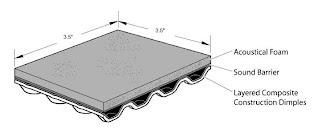Soundproofing Your Audio Recording Studio Efficiently
With
constant advancement in digital technology, it has become easier to record
audios and produce music at home. You can now create your own audio recording
studio for any purpose, but while setting up there is one important factor that
you need to map out – soundproofing. Yes! Soundproofing makes your room
quieter, by blocking out all external and internal noise. So, ideally any
recording studio should have an efficient soundproofing system to absorb the
reflected waves and produce clear quality sound.
Soundproofing
helps in producing professional quality audio, while keeping the outside noise
away from being captured and recorded. Luckily, an excellent voice waves
blocking helps in keeping the noise in control and do not disturb the people
next door.
So, how
could you insulate a recording room from outside disturbances effectively? Mentioned
below are few of easiest and simplest methods to soundproof and some helpful advice
and suggestions on how to add them.
Apply Anti-Vibration
Isolation Pads
The most
innovative method for soundproofing is anti-vibration isolation pads from Super Soundproofing. These isolation
pads are mostly made from high quality rubber polymers and cork materials to
avoid passage of voice from inside-out. The design and fabrication of these
pads are such that they are highly resistant to strong sound waves. Padding
helps in dissipating and slow down sound vibrations that don’t want transmitted
across surfaces. You can also get vibration isolation pads for speakers, drum and other sound equipment that normally
produces vibrations.
Add Volume
to Walls
If you are
interested in constructing a new room, add some mass to wall. Make it more
dense and thick that can absorb the sound and make the room fit for recordings
and dubbings. Whenever the sound waves will hit the dense barrier, it will
either be absorbed or reflected back in the room, or both can occur
simultaneously. For sure, this will help in keeping the sound waves inside.
Make Use of
Wall Padding
Instead of
adding density to room, you can soundproof by adding foam mats or absorbent
panels that can soften the noise intensity and reduce the level of acoustics
outside the room. Basically, the absorbent panels are made up of foam, which
helps in controlling the responses to sound. This ensures one thing, that there
was no acoustically impaired atmosphere.
Leave gap
between spaces:
Sometimes it
becomes difficult to join wall and ceilings together using acoustic sealant. At
that time you can use Whisper Clips and channels. The biggest perk of these is
that it keeps the structural layers apart from each other, which ultimately
results in creating air gaps that inhibits the passage of bass vibration
directly from the drywall and into the room and vice versa. And, in case you
have already filled the gap with acoustical sealant and used fiberglass to
induce strength to the wall, you are still free to use Whisper Clips and
channels. These can help in creating a secondary walk of vibrations and sounds,
which will eventually makes an ideal soundproofing solution for your
professional-quality studio.
Use Foam
gaskets to seal gaps
Once you
find the space between walls, fill them with foam gaskets. Foam gaskets provide
a smarter and efficient solution to reduce the impact of energy dissipation
through the walls. A number of solutions are available out there to do the job
well, but you need to find the most appropriate one to get the job done
perfectly. Do not forget to put rubber gasket near the doors and window to make
your room a professional audio recording studio.
These are
few common methods of soundproofing your audio recording studio efficiently.
You can choose anyone or else integrate all to your room, and enjoy an
insulated audio recording room at your home. Ask soundproofing professionals to
suggest the best vibration isolation
pads, foam gaskets, wall padding and other material to insulate the indoor
from outdoor world.


Comments
Post a Comment